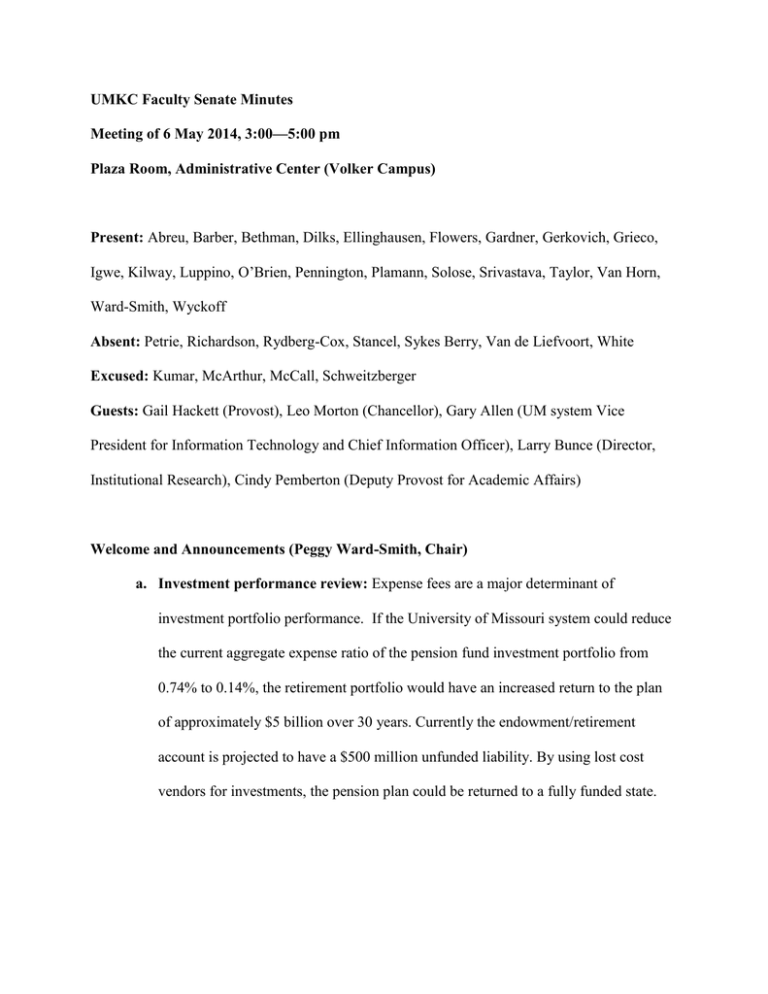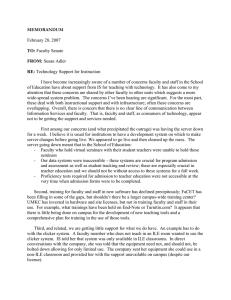UMKC Faculty Senate Minutes Meeting of 6 May 2014, 3:00—5:00 pm
advertisement

UMKC Faculty Senate Minutes Meeting of 6 May 2014, 3:00—5:00 pm Plaza Room, Administrative Center (Volker Campus) Present: Abreu, Barber, Bethman, Dilks, Ellinghausen, Flowers, Gardner, Gerkovich, Grieco, Igwe, Kilway, Luppino, O’Brien, Pennington, Plamann, Solose, Srivastava, Taylor, Van Horn, Ward-Smith, Wyckoff Absent: Petrie, Richardson, Rydberg-Cox, Stancel, Sykes Berry, Van de Liefvoort, White Excused: Kumar, McArthur, McCall, Schweitzberger Guests: Gail Hackett (Provost), Leo Morton (Chancellor), Gary Allen (UM system Vice President for Information Technology and Chief Information Officer), Larry Bunce (Director, Institutional Research), Cindy Pemberton (Deputy Provost for Academic Affairs) Welcome and Announcements (Peggy Ward-Smith, Chair) a. Investment performance review: Expense fees are a major determinant of investment portfolio performance. If the University of Missouri system could reduce the current aggregate expense ratio of the pension fund investment portfolio from 0.74% to 0.14%, the retirement portfolio would have an increased return to the plan of approximately $5 billion over 30 years. Currently the endowment/retirement account is projected to have a $500 million unfunded liability. By using lost cost vendors for investments, the pension plan could be returned to a fully funded state. b. Syllabus on Blackboard: The option to upload syllabi to Blackboard will be available on Blackboard in the summer. The option to upload grades is already available. c. Faculty workload document available: the faculty workload document is available on the faculty senate website at: http://www.umkc.edu/facultysenate/resources/index.shtml UMSL faculty has started to implement this already. IFC would like this to be implemented within 2 years. Please email feedback to the IFC representatives. d. Senate representatives on grievance panel: The grievance panel requires 4-5 tenure or tenure-track faculty to serve. Ideally there will be 4-5, because once a grievance is filed, the process needs to begin within 10 business days. e. Gilman Study Abroad Scholars: UMKC has 7 scholars this year and UMKC has never had that many before. The communication group will need to advertise this. UMKC is doing really well in study abroad. f. Election results: Kathleen Kilway was elected as Vice-chair and Nancy Stancel as IFC position. Faculty Senate officers thank all who ran for their willingness to serve. Approval of Agenda/Minutes Agenda and minutes approved. Provost Comments The search for the Dean of Medicine is moving forward and the search committee is doing airport interviews later this week. It is not yet clear when UMKC can bring the finalists to campus, but will not be before the end of the semester. Most of the faculty at the School of Medicine is year-round, which means the faculty can interview the finalists this summer. Ideally the new dean will begin in the fall or January. The search for the Dean of the Honor’s College has begun and the search committee will begin soon. This search is funded through the system strategic plan. AAUP Report and Amendment (Leo Morton, Chancellor) There was a tax cut bill, and the governor warned that it would hurt the ability to fund higher education. The Governor’s veto was overridden by the Senate and House of Representatives and the bill passed. UMKC students have been talking about this issue on campus and referring to it as a “budget crisis.” However, UMKC has a pathway to balance the budget by turning around the enrollment numbers. Recently, a local AAUP report was distributed indicating that administrative salary & wages had increased at a higher rate than faculty over the past several years. Chancellor Morton reported that some of the data used in the report was faulty. The division between administration, faculty, and staff can be quite complicated. One of the reasons being that the recent title classification project for staff resulted in a large number of administrative staff getting salary increases, bumping up the data for the administrative category in the report. The University provided corrected data to the AAUP chapter and a revised report was subsequently distributed. ERP System (i.e. PeopleSoft) presentation (Gary Allen, UM system Vice President for Information Technology and Chief Information Officer) PeopleSoft began in 1997 and it took a long time to deploy throughout the system and it took until 2008 to get all the campuses up. Since then, more functionality has been added. Not all of what we paid for is being fully utilized. There have been a large number of modifications made to the “as distributed” software and then there is only one week every year to upgrade the system. The HR system, for example, needs to be upgraded, but the HR system can’t afford to have their system down for more than a day. The next available time to upgrade it is the first weekend in June. The cost for the system this year was 17 million dollars. The system pays for some of the amount and that amount is decreasing every year and then each campus pays its share, based on head count and other criteria. Right now the cost of the software is growing 14% annually. The Chancellor wants the budget to be held flat. We will look at what peer institutions are doing to keep costs under control. There will be a business process assessment by the end of the calendar year, which will be put into a report that will be sent out. A system steering committee will review, quantify and document the current ERP cost structure (including related campus-specific costs) and assess the current high level business processes enabled by the ERP applications and then identify opportunities for integration and shared capabilities. This will help to validate whether Peoplesoft is the optimal long-term ERP. This process will last for the rest of the calendar year. Ideally, effective practices will be built into the administrative system, which will standardize and eliminate exceptions as much as possible and avoid unnecessary local optimization. It will also bring IT and business-related decisions to the appropriate leadership groups for discussion and direction. COACHE Summary (Larry Bunce, Director, Institutional Research, and Cindy Pemberton, Deputy Provost for Academic Affairs) The COACHE faculty satisfaction survey was founded in 2002, and operates out of Harvard. Over 200 universities have participated in the consortium. Ideally it will be used to build a culture of success and maintain a vibrant faculty. The survey is designed to build an actionable diagnosis. The survey was revised and now includes tenure and tenure-track faculty (In 2008 it was only sent to tenure-track faculty). The system was invited to participate in the COACHE survey in 2005, but decided against it. The system negotiated for a better price and then participated in 2008. The Provost wanted UMKC to participate in Fall 2013 and to start the process, an institutional team was formed to ensure a more systematic approach to get faculty to participate in the survey. The focus is finding areas for the university to improve. Overall descriptive summary data are being reviewed and shared at this time. As peer data are received, it will be shared with groups across campus to close the loop and let people know what the campus is looking at with the data. The Faculty Senate is the first group that it is being brought to. Currently, there is no comparison data, but there will be. The response rate of the survey was 56%, and there were 222 usable responses. That is extremely good. Of those that participated, only one peer institution had a higher response rate, and the average response rate was 46%. The five best aspects of working at UMKC in rank order were: quality of colleagues, cost of living, geographic location, support of colleagues and academic freedom. The worst aspects in rank order were: compensation, lack of support for research/creative work, quality of leadership, too much service, and quality of facilities. There will be different reports that will be put out such as mentoring. The data will be broken down into different areas and put into more manageable reports for the campus. Those reports will be available on the website. This will be a yearlong process that looks at the data and figures out what can be implemented to shift perceptions on campus. General Education Update/Decision (Jerry Wyckoff) This year the General Education program is working on getting courses approved and running. Last semester, of the over 1,000 students who came in, almost all of them took an anchor 1 course. There have been some difficulties in scheduling smaller discourse classes with larger anchor courses, because they have to be paired similarly to a lab course. There have been numerous discussions over the previous weeks on how to communicate on these issues. Even though we were trying to keep discourse courses low, with caps of 20 students on discourse courses 1 and 2 and 16 students on discourse 3 courses. Arts and Science says that is too low to sustain. So, in discourse 1-2, the caps for the courses will be a soft 20 and a hard 22 and then for discourse 3, it will be a soft 18 and a hard 20, but the General Education Curriculum Committee has not agreed to the changes yet. All other campus groups have supported this change and the Faculty Senate is the last group that is being asked to approve this. Faculty Senate voted to support this change. Steve Dilks will be stepping down as Discourse Coordinator and the question of how to select instructors has come up. The English and Communications departments provided the faculty. But because of the low caps, lots of sections had to wait to see if they would fill up and the discourse instructors felt disenfranchised. Over the summer, the GECC will look into creating a new structure. Ideally there will start to be a stable pool of anchor courses each semester, this year they have not been stable. If departments want to have an Anchor course, they need to let us know earlier. One of the problems is that the courses happen very last minute. Next year, we will try to facilitate a discussion between Anchor and Discourse courses. Nathan Lindsay ran a focus group with students and received feedback from them. We will try to do a survey of instructors to see problem areas in the program. As we understand the issues, we can improve and move into a more normal running of the program. There is a celebration of the first year of Anchor and Discourse curriculum Thursday, May 8th 9:30-11:30 in the Plaza Room. Adjournment Faculty Senate adjourned their last meeting of the 2013/2014 academic year.
